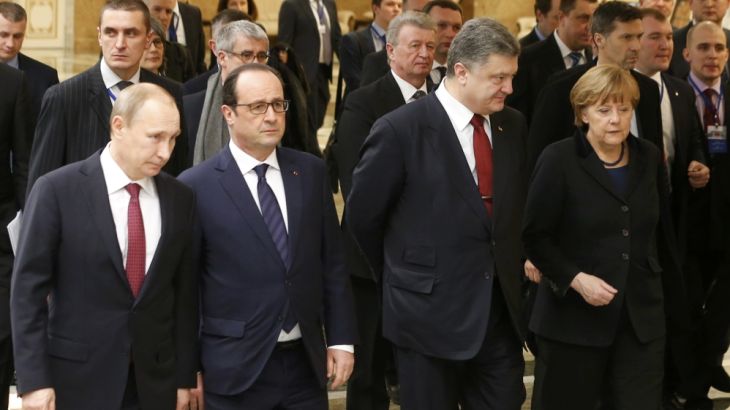Leaders agree on Ukraine peace roadmap
A deal is reached on a ceasefire and heavy weapons withdrawal in Ukraine but EU leaders say much work still to be done.

A new roadmap aimed at ending a 10-month civil war between Ukraine and pro-Russian separatists has been approved by leaders of Germany, France, Russia and Ukraine.
The deal, announced after more than 16 hours of discussions through the night in the Belarusian capital, Minsk, offers a “glimmer of hope” for an end to conflict in eastern Ukraine.
Keep reading
list of 4 itemsPutin: Concert hall shooting is act of intimidation by Kyiv
How will the Moscow concert hall attack affect Putin?
Moscow theatre attack suspects show signs of beating in court
Russian President Vladimir Putin said a ceasefire would take effect on Sunday (22:00 GMT on Saturday), and that heavy weapons would be withdrawn from front lines of the conflict, which has already killed at least 5,300 people and driven hundreds of thousands from their homes.
|
|
| Will the Ukraine peace deal work? |
The roadmap – meant to ease a crisis that has plunged the West and Russia into their bitterest dispute since the Cold War – also calls for constitutional reform to give eastern Ukraine more autonomy.
A previous truce signed in Minsk last September quickly collapsed.
French President Francois Hollande described the deal as “a comprehensive political solution”, while German Chancellor Angela Merkel spoke only of a “glimmer of hope”.
“I have no illusions. We have no illusions,” she said, adding that “much work” remained.
The US, which has said it could supply Ukraine with hi-tech weapons if the conflict continues, cautiously welcomed the accord, calling on Russia to stop its alleged support for the rebels.
Ukrainian President Petro Poroshenko described the talks as “very difficult” and said he expected the implementation of the deal would not be easy.
Al Jazeera’s Rory Challands, reporting from Minsk, said: “There are massive problems going on. … Now what we’ve heard as the latest is that Poroshenko is calling certain parts of the Russian position unacceptable.”
The talks in the Belarusian capital were seen as a last opportunity for European leaders to save nearly bankrupt Ukraine from ever-widening defeats at the hands of rebels said by Kiev and the West to be armed by Russia.
Even as the deal was agreed, fighting over the last 24 hours in eastern Ukraine killed 10 civilians and two Ukrainian soldiers, Kiev and rebels said.
Financial rescue plan
In another boost for Ukraine’s government, Christine Lagarde, the IMF chief, said a deal had been reached on a new financial rescue plan worth $17.5bn.
In total, Ukraine will receive $40bn (35bn euros) in assistance over four years coupled with bilateral loans from other sources, Lagarde said, helping to stabilise Kiev’s finances after 10 months of conflict in the east.
Despite the deal, Ukraine and Russia continue to disagree on how to end fighting around the eastern railway hub of Debaltseve.
|
|
| Ukraine fighting continues despite deal |
The two sides also differ on the question of autonomy for eastern Ukraine.
“Despite firm insistence we didn’t agree on any status of autonomy for eastern region. … We didn’t agree on federalisation,” Poroshenko said.
The Ukrainian government also accused Russia of deploying another 50 tanks across the border overnight.
Hollande, Merkel and Poroshenko flew from Minsk to Brussels for a European Union summit, where Hollande said it was essential to keep up the pressure to ensure the accord’s success.
“The next few hours will be decisive as it could go either way,” he said.
Poroshenko, also speaking in Brussels, warned it was difficult to trust the other side and accused the rebels of launching an “offensive operation” in advance of the ceasefire.
“It was very difficult negotiation and we expect not easy implementation process,” he said after briefing EU leaders on the accord.